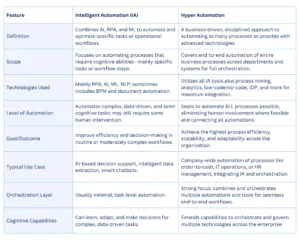Businesses all over the world are experiencing a crucial time in the current economy. There are various factors behind it. However, one of the most powerful reasons that drives the change in businesses today is technological advancement. Moreover, this tech-savvy era is mainly navigated by the evolution of artificial intelligence. In this blog, we shall discuss two important automation terms, usually intermixed: Intelligent automation and hyperautomation. These are two different approaches to digital process automation that use AI-powered technologies to streamline business operations. So, let’s get into the key differences of intelligent automation vs hyperautomation for a deeper understanding of each term.
What is the Scenario of the Automation Industry?
The automation industry is undergoing tremendous growth. According to Gartner’s report, 30% of enterprises will have more than half of their business operation automated by 2026. Moreover, 90% of large companies are planning to adopt hyper automation strategies as a basic requirement. On the other hand, Intelligent Automation is saving organizations costs, boosting accuracy, and helping them discover new operational efficiencies. Let us dive deeper into the market trends regarding intelligent automation and hyper automation.
Market Trends of Hyper Automation and Intelligent Automation
In recent years, especially after the pandemic, there has been a massive growth in intelligent automation and RPA. Even the hyper automation market is growing rapidly. Intelligent automation is being used in finance, healthcare, and logistics because of its ability to integrate structured task automation with machine learning and natural language processing. The global intelligent automation market is expected to cross $ 115.17 billion by the year 2034. The compound annual growth rate will be about 23.6%. Another study revealed that the global hyperautomation market will surge to $ 270.63 billion by 2034, with a CAGR of 17.04%.
The reason why the automation market is growing exponentially is that it helps businesses reduce operational costs, provides quick customer service, and enhances data quality. To understand how automation works, let us first understand what these two terms mean.
Do you wish to automate your business and make profits? – See what IA and Hyper automation can do for you.
What is Intelligent Automation
Intelligent automation (IA) is the combination of Robotic process automation (RPA) with advanced technologies like machine learning, artificial intelligence, natural language processing, and optional character recognition (OCR). The main purpose of IA is to automate everything from rule-based processor operations to self-determination functions.
Intelligent automation combines RPA with AI and machine learning solutions to simplify processes, make decisions, and create a flexible workflow. It is used mainly in automating structured workflows that are semi-cognitive, like email deciphering, document verification, or invoice processing. So, imagine a workflow where IA would use OCR to collect data from invoices, utilize NLP for making sense of it and categorizing them, machine learning solutions for anomaly detection, and RPA to enter verified data directly into the ERP system. Thus, automation and cognition are the reasons why IA is so in demand. Especially for businesses that require task-specific efficiency and contextual awareness.
Core Technologies of Intelligent Automation
At the core of Intelligent automation are some technologies that all it to automate structured tasks. These technologies include:
-
RPA (Robotic Process Automation)
RPA automates rule-based, repetitive tasks like data entry, reconciliation, or form submission. It is the key technology that forms the base of both IA and hyper automation.
-
AI and Machine Learning
AI and machine learning solutions bring adaptivity to intelligent automation. Machine learning models enhance accuracy and can also detect trends or anomalies in a dataset. This enables real-time decision-making.
-
Natural Language Processing
NLP allows the understanding and processing of text or voice data. For example, understanding chats or documents.
-
OCR (Optional Character Recognition)
Optional Character Recognition extracts text from documents and image scans, thus allowing automation of the data that was previously inaccessible.
-
Business Process Management
BPM supports workflow orchestration and human-robot collaboration in an intelligent automation-driven landscape.
All these technologies together make IA capable of automation beyond the execution of repetitive tasks.
Benefits of Intelligent Automation
There are several benefits of intelligent automation in business operations; the important ones are highlighted below.
-
Operational Efficiency
Intelligent automation automates high-volume processes with precision. This offers faster processing with fewer errors.
-
Cost Reduction
With lesser manual work, intelligent automation cuts operational costs in several industries like finance, human resources, and customer support.
-
Improved Accuracy
Bots are bound to follow rules strictly. Thus, consistency and compliance are ensured to meet regulatory standards.
-
Enhanced Customer Experience
Faster processing and fewer errors due to intelligent automation deliver better services. Thus, customer experience is enhanced. When it comes to customer support, automated responses with natural language processing are more likely to engage customers and provide prompt solutions to their queries.
-
Flexibility
Intelligent automation is flexible and adaptable. It adjusts the workflow and processes according to changes in the outer environment.
-
Scalability
Whether you’re a small business owner or a larger enterprise, you can scale your IA system as you grow. From its use in a couple of processes to large-scale, multiple processes, intelligent automation is highly scalable and effective.
What is Hyper Automation?
Hyper automation is a business-wide approach that can automate multiple business and IT processes utilizing a combination of advanced technologies. Differing from intelligent automation, hyper automation focuses on end-to-end, all business functions. It has an expanded framework that caters to all business needs rather than singular processes.
Hyper automation is defined as the systematic use of multiple technologies, including RPA, process mining, low-code development tools, and analytics, to automate entire processes at scale. Unlike an intelligent automaton, hyper automation is not a toolbox. It is a structure for digital transformation dependent on the interplay of automation assets.
This clarifies the difference between intelligent automation and hyper automation. While IA creates automation, hyper automation creates an entire framework that can be applied across the organization.
Core Technologies or Components of Hyper Automation
A hyper automation framework includes:
-
RPA and AI
These are common core technologies between intelligent automation and hyper automation. The difference lies in their utilization, as the hyper automation framework uses it for multiple processes.
-
Process Mining
Process mining extracts and analyzes event logs to optimize business processes.
-
Low-code/ No-code platforms
This enables the speedy development of bots, workflows, and applications without much coding. This empowers citizen developers.
-
iPaaS (Integration Platform as a Service)
It provides a medium or a middleware to connect different systems, data sources, and APIs into unified automation workflows.
-
Real-time Analytics
Analytics offer visibility into the performance of automation processes. Thus, it enables predictive insights and also supports adaptive decision-making.
Benefits of Hyper Automation
Hyper automation is an entire automation system that utilizes a set of core technologies to streamline multiple, often entire business processes. It, of course, has a lot of benefits that we shall see in brief now.
-
Full process orchestration
Differing from intelligent automation, which works on task-level automation, hyper automation connects entire workflows across the organization.
-
Predictive decision-making
Integration of intelligent automation and analytics allows forecasting of trends, bottleneck detection, and proactive responses.
-
Scalability and Flexibility
Hyper automation can be adopted in a pilot project and later scaled across multiple departments. It is easy to scale and is flexible with changes in the processes as well.
-
Governance and Compliance
A centralized orchestration or supervision allows better control over bot behavior, compliance, policies, and audit preparation.
-
Innovation
As automation reduces manual load, human capital can be invested in strategic and innovative initiatives.

Intelligent Automation vs Hyperautomation- What To Opt For?
Both intelligent automation and hyper automation are a part of the automation industry. We have seen details that clarify the difference between intelligent automation and hyper automation. Now, the question arises: which one is better for your organization? Which type of automation to opt for? The answer is subject to the organization’s specific requirements. If you wish to optimize only a part of your workflow or a specific repetitive task, you can opt for intelligent automation. On the other hand, if you are looking for a full-fledged automatic workflow across departments in your organization, then you should choose hyper automation. However, if neither of them seems appealing to you, or you feel that you are not ready for either of them, you can talk to an RPA consulting company; they will guide you further.
Limitations of Automation
Although there are many benefits of automation in business processes, there are still some challenges that need to be addressed before implementing automation. These challenges are mainly regarding
- Integration with legacy systems
- Data Quality and Security
- Change management
- Filling skill gaps
- High initial investment
To overcome these challenges, steps need to be taken by the business owners and stakeholders. A strategic step-by-step plan can help build a smooth automation process for your organization. These steps are:
- Conducting Process Audits Frequently
- Using low-code tools to speed up the deployment
- Partnering with a reliable RPA service provider
- Training and upskilling your employees
- Governance and Compliance planning
Automation is the new business trend, leading to exponential growth- Automate your workflow, with our expertise!
Future Outlook of Automation
Due to increased efficiency and cost savings, automation is highly preferred by a lot of enterprises and businesses. More businesses will shift towards automated workflows in the coming years. Automation might be costly during the initial investments, but it promises a good ROI over time. So, it will become essential to implement automation to remain competitive with other businesses in the market. AnavClouds Analytics.ai provides trusted RPA consulting services and expertise. Get in touch with us to adopt automation in your organization.
Conclusion
Automation is a smart way to upgrade your business and leverage technologies to make more profits. Using intelligent automation, businesses can automate some operational processes. On the other hand, hyper automation enables end-to-end automation of all processes across departments in an organization. Hyper automation thus streamlines the entire workflow in a business. Such automation offers efficiency, speed, low error rates, and higher productivity. By freeing up human capital from repetitive tasks, it also boosts innovation. With a trusted AI development companies like AnavClouds Analytics.ai, you can understand the scope of AI, intelligent automation and RPA in your organization. Book a demo and understand the details of automation and AI.
FAQs
What is the difference between Hyper automation and RPA?
RPA is focused on automating task-specific, rule-based operations through software robots. Hyper automation utilizes RPA and other technologies to automate entire end-to-end processes in an organization.
Is intelligent automation the same as RPA?
No, they are not the same. While RPA is task-specific and strictly rule-based, it only operates definitively and operates through applications. On the other hand, intelligent automation has cognitive abilities and can learn and adapt with experience.
What is another name for intelligent automation?
Intelligent automation is also referred to as smart automation.
What is the difference between AI and Hyper automation?
The scope of AI automation is narrower than hyper automation. Hyper automation uses AI as one of its core technologies to streamline entire processes across an organization.
Is intelligent automation part of AI?
No intelligent automation is not a part of AI; rather, AI forms one of the 3 core technologies of intelligent automation.



